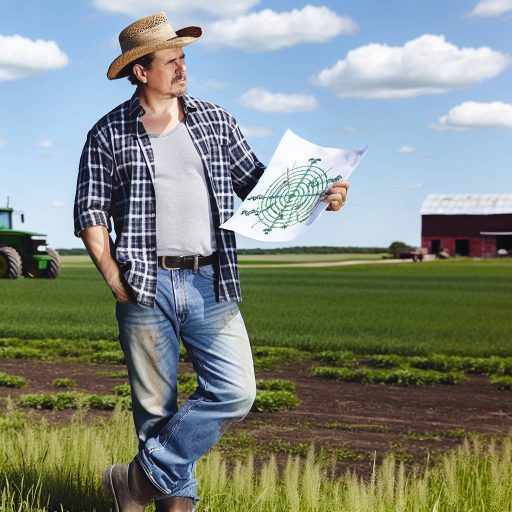Quality Control Inspector in farming ensures products meet standards.
Quality control is crucial for ensuring buyer satisfaction and safety.
Step 1: Education and Training
When it comes to becoming a quality control inspector in farming, it is important to have the right education and training to excel in this career.
Here are some steps to consider in order to achieve your goal:
Educational Requirements
To become a quality control inspector in farming, a high school diploma or equivalent is typically required.
However, having a college degree in agriculture, biology, or a related field can be beneficial.
Some employers may also look for candidates with specialized knowledge in areas such as pest management, soil science, or food safety.
Training Programs
There are various training programs available for aspiring quality control inspectors in farming.
These programs can provide hands-on experience and knowledge in areas such as crop inspection, quality standards, and regulatory requirements.
Some of the training programs to consider include:
- On-the-Job Training: Many quality control inspectors in farming learn through on-the-job training. This can involve shadowing experienced inspectors, learning about inspection techniques, and understanding the specific requirements of the job.
- Professional Certifications: Obtaining a professional certification can demonstrate your expertise and knowledge in quality control inspection. Some certifications to consider include the Certified Crop Advisor (CCA) certification or the Certified Quality Inspector (CQI) certification.
- Internship Programs: Participating in an internship program can provide valuable hands-on experience and networking opportunities in the farming industry. Internships can help you gain practical skills and make connections that can lead to job opportunities in quality control inspection.
- Continuing Education: Continuing education is important for quality control inspectors in farming to stay updated on the latest industry trends, technologies, and regulations. Attending workshops, seminars, and conferences can help you enhance your skills and knowledge in the field.
By completing the necessary education and training requirements, you can position yourself for success as a quality control inspector in farming.
It is important to stay dedicated to your professional development and continuously seek opportunities to improve your skills in order to excel in this rewarding career.
Step 2: Gain Practical Experience
Seek internships or part-time jobs in the farming industry to get hands-on experience.
Learn from experienced quality control inspectors by shadowing them and observing their work process.
Practical experience is crucial in becoming a successful quality control inspector in farming.
This step allows you to see firsthand the various tasks and responsibilities that come with the job.
Here are some detailed tips on how to gain practical experience:
Internships
One of the best ways to gain practical experience in the farming industry is through internships.
Internships provide you with the opportunity to work closely with professionals in the field and learn from their expertise.
Look for internships at farms, agricultural companies, or quality control inspection firms.
Transform Your Career Today
Unlock a personalized career strategy that drives real results. Get tailored advice and a roadmap designed just for you.
Start NowThis hands-on experience will help you develop essential skills and knowledge that are necessary for this role.
Part-Time Jobs
If you are unable to secure an internship, consider taking on part-time jobs in the farming industry.
Working part-time on a farm or at agricultural facilities will expose you to the day-to-day operations of farming and quality control inspection.
While working part-time, make sure to pay attention to the quality control practices being implemented and ask questions to gain a better understanding.
Learning from Experienced Inspectors
Another valuable way to gain practical experience is by learning from experienced quality control inspectors.
Reach out to professionals in the field and ask if you can shadow them during their inspections.
Observing how experienced inspectors approach their work, make decisions, and handle challenges will provide you with insights that you won’t get from textbooks or classroom learning.
Take notes, ask questions, and seek feedback to enhance your learning.
By gaining practical experience through internships, part-time jobs, and learning from experienced quality control inspectors, you will build a strong foundation of knowledge and skills that will set you up for success in your career as a quality control inspector in farming.
Don’t underestimate the value of hands-on experience in this field, as it will ultimately shape you into a competent and effective professional.
Uncover the Details: Interview with a Professional Conservation Scientist
Step 3: Develop Skills and Knowledge
When it comes to becoming a quality control inspector in farming, developing the right skills and knowledge is crucial.
Here are some key steps to help you enhance your capabilities in this field.
Familiarity with Agricultural Practices and Regulations
- Understand the various farming methods and techniques used in agricultural production.
- Stay updated on the latest trends and developments in the farming industry.
- Be knowledgeable about the regulations and standards set by government agencies for farming practices.
- Attend workshops, seminars, and training sessions focused on agricultural practices and regulations.
- Network with other professionals in the agriculture sector to exchange knowledge and insights.
Attention to Detail and Strong Analytical Skills
- Pay close attention to small details and nuances in the quality control inspection process.
- Develop the ability to analyze data and information effectively to identify potential issues or areas of improvement.
- Use critical thinking skills to evaluate different aspects of farming operations and processes.
- Practice conducting thorough inspections and assessments to ensure the highest level of quality in farm products.
- Learn to communicate findings and recommendations clearly and effectively to stakeholders and team members.
By focusing on these skills and knowledge areas, you can position yourself as a competent and reliable quality control inspector in the farming industry.
Continuous learning and professional development will be key to maintaining your expertise in this role.
Learn More: Innovative Conservation Projects Around the World
Step 4: Networking
Networking is a crucial aspect of becoming a quality control inspector in farming.
By connecting with professionals in the industry, you can gain valuable insights, knowledge, and opportunities to advance your career.
Joining professional organizations in the farming industry
One of the best ways to network in the farming industry is by joining professional organizations such as the American Society of Agricultural and Biological Engineers (ASABE) or the American Farm Bureau Federation.
These organizations provide a platform for professionals to connect, share information, and stay updated on industry trends.
Transform Your Career Today
Unlock a personalized career strategy that drives real results. Get tailored advice and a roadmap designed just for you.
Start NowBy becoming a member, you can attend networking events, workshops, and conferences where you can meet other quality control inspectors, farmers, researchers, and industry experts.
Attending conferences and workshops
Conferences and workshops are excellent opportunities to network with professionals in the farming industry.
These events bring together individuals from various sectors of agriculture, allowing you to learn from experts, exchange ideas, and build relationships.
By attending these gatherings, you can stay current on the latest technologies, best practices, and regulations in farming.
Additionally, you may even have the chance to present your own research or findings, further establishing yourself as a knowledgeable and respected quality control inspector in the field.
Networking is a fundamental step in advancing your career as a quality control inspector in farming.
By actively engaging with professionals in the industry, you can expand your knowledge, develop new skills, and open doors to exciting opportunities that can help you grow and succeed in your role.
Delve into the Subject: Role and Duties of an Agricultural Technician

Step 5: Apply for Quality Control Inspector Positions
Search for job openings in the farming sector.
Begin your job search by looking for quality control inspector positions in the agricultural industry.
You can explore job boards, company websites, and industry-specific platforms to find relevant job listings.
Tailoring your resume and cover letter for quality control inspector roles.
Once you have identified job openings that interest you, it’s essential to customize your resume and cover letter.
Highlight your qualifications and experience in quality control inspection.
Tailor your application materials to match the requirements of each job description.
- Search for job openings in the farming sector.
- Tailoring your resume and cover letter for quality control inspector roles.
Learn More: Understanding the Role of an Animal Nutritionist
Step 6: Interview Preparation
Understand common interview questions for quality control inspector positions.
Be prepared to discuss your experience with quality assurance processes.
Expect questions about your ability to identify and resolve issues in a timely manner.
Anticipate inquiries regarding your knowledge of industry-specific regulations and standards.
Transform Your Career Today
Unlock a personalized career strategy that drives real results. Get tailored advice and a roadmap designed just for you.
Start NowBe ready to explain how you ensure the accuracy and integrity of data and reports.
Showcase your skills and experience in the interview.
Highlight your attention to detail and strong analytical skills.
Share examples of how you have improved processes or implemented quality control measures in the past.
Demonstrate your ability to work well under pressure and meet tight deadlines.
Emphasize your communication skills and ability to work effectively in a team environment.
Remember to dress professionally, arrive early, and bring extra copies of your resume to the interview.
It’s crucial to research the company and the role you are applying for to show your genuine interest and enthusiasm.
Good luck!
Importance of Quality Control in Farming
Quality control inspectors play a crucial role in ensuring the quality and safety of farm products.
By pursuing a career in quality control inspection in farming, you can contribute to the industry’s growth and sustainability.
Remember, the work of a quality control inspector is important in meeting regulatory standards and ensuring consumer satisfaction.
If you have a keen eye for detail and a passion for maintaining high quality standards, consider becoming a quality control inspector in farming.
Joining this field will not only allow you to make a positive impact on the agriculture industry but also enhance your own skills and knowledge.
Take the necessary steps to gain the relevant education and experience needed to become a successful quality control inspector in farming.
Additional Resources
Food Product Dating | Food Safety and Inspection Service
Shell Eggs from Farm to Table | Food Safety and Inspection Service




